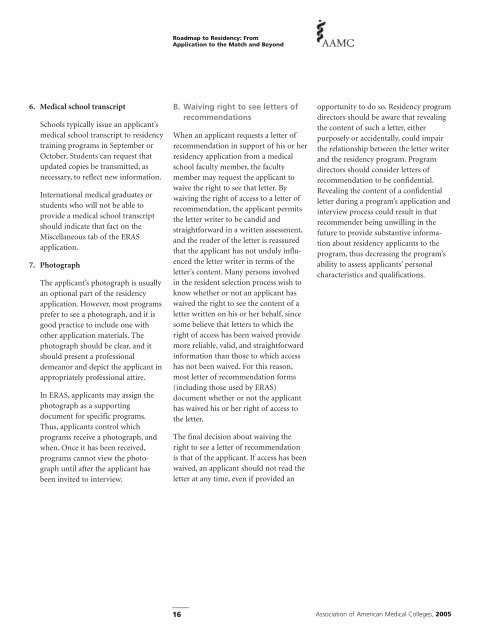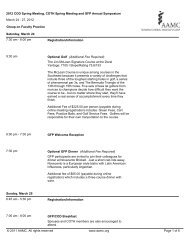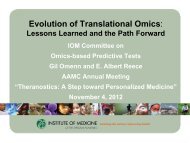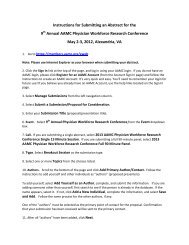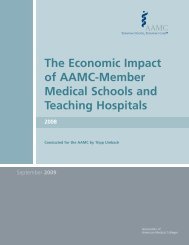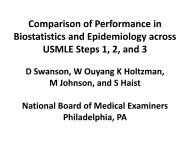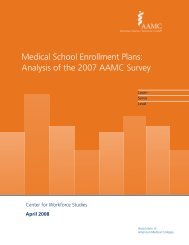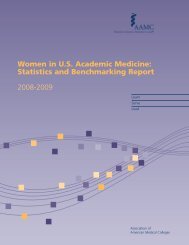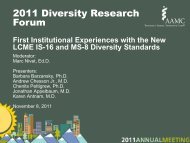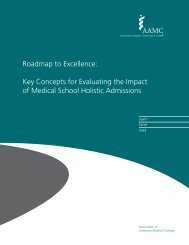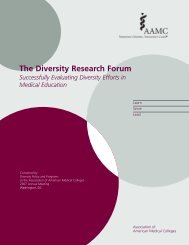<strong>Roadmap</strong> <strong>to</strong> <strong>Residency</strong>: FromApplication <strong>to</strong> the Match and Beyondallows this slot <strong>to</strong> be used <strong>to</strong> transmita military evaluation form when anapplication is being submitted <strong>to</strong>military residency programs.Some programs may request that oneof the letters of recommendation befrom the department chair in therespective specialty at the applicant’smedical school. The applicant shoulddesignate that this letter is from thedepartment chair when filling in theletter writer’s “Title/Department” inERAS.Ideally, the applicant will have metpersonally with each letter writer andwill have provided specific instructions<strong>to</strong> him or her before the letter iscomposed and submitted. It is notinappropriate, in requesting a letterof recommendation, for an applicant<strong>to</strong> ask the letter writer whether he orshe would be able <strong>to</strong> write a goodletter for the applicant. If the letterwriter is in any way unable <strong>to</strong> providethis assurance, then it might be bestfor the applicant <strong>to</strong> select anotherindividual <strong>to</strong> serve as a reference.The applicant should ensure that theletter writer is familiar with what isrequired in a letter of recommendationfor a residency training programapplication; letters that are <strong>to</strong>o briefand <strong>to</strong>o generic may detract from anotherwise competitive application.The letter writer should be provided,in advance, with a copy of theapplicant’s resume for referencepurposes. The applicant should alsofollow up with the letter writer <strong>to</strong>ensure that the letter of recommendationhas reached its destinationprior <strong>to</strong> the deadline date.4. USMLE and/or COMLEX scorereportsThe National Board of MedicalExaminers (NBME, www.nbme.org)and the ECFMG (www.ecfmg.org)charge a fee for unlimited electronictransmittals of an applicant’s USMLEStep score reports via ERAS. TheNational Board of OsteopathicMedical Examiners (NBOME,www.nbome.org) charges a fee forunlimited electronic transmittals ofthe applicant’s COMLEX scorereports via ERAS. These fees includesending the score report <strong>to</strong> additionalprograms subsequently applied <strong>to</strong>, aswell as updating the score report withany new scores.For programs not participating inERAS, applicants should visit theUSMLE (www.usmle.org) andNBOME (www.nbome.org) Web sitesfor additional information onrequesting a paper score report.5. Medical Student PerformanceEvaluation (MSPE)A formal evaluation from theapplicant’s medical school usuallyaccompanies his or her residencyapplication. For students at andgraduates of U.S. allopathic and osteopathicmedical schools, the dean ofstudent affairs or a school official in acomparable position typicallycompiles the Medical StudentPerformance Evaluation (MSPE),previously known as the “Dean’sLetter.” For applicants <strong>to</strong> ACGMEaccreditedresidency trainingprograms, MSPEs are released on orafter November 1 of each applicationseason.The MSPE represents an evaluation ofa medical student’s performanceduring the process of medicaleducation; it is not intended <strong>to</strong> be arecommendation or a prediction offuture performance. The MSPE shoulddescribe, in a sequential manner, thestudent’s performance relative <strong>to</strong> hisor her peers through three full years ofmedical school and, as much aspossible, the fourth year. The MSPEshould include an assessment of boththe student’s academic performanceand professional attributes.The MSPE, as an institutionalassessment, should be considered acomponent of the student’spermanent record, and thus shouldbe available for a student’s review.The student should be permitted <strong>to</strong>correct factual errors in the MSPE,but not <strong>to</strong> revise evaluative statements.The <strong>AAMC</strong> document, “AGuide <strong>to</strong> the Preparation of theMedical Student PerformanceEvaluation,” can be found on theERAS Web site(www.aamc.org/students/eras,Resources <strong>to</strong> Download).International medical graduates orstudents can request that an appropriateofficial at their medical schoolwrite an evaluation equivalent incontent and format <strong>to</strong> the MSPE.International medical graduates whowill not be able <strong>to</strong> provide an MSPEor its equivalent should indicate thatfact on the Miscellaneous tab of theERAS application.15Association of American Medical Colleges, 2005
<strong>Roadmap</strong> <strong>to</strong> <strong>Residency</strong>: FromApplication <strong>to</strong> the Match and Beyond6. Medical school transcriptSchools typically issue an applicant’smedical school transcript <strong>to</strong> residencytraining programs in September orOc<strong>to</strong>ber. Students can request thatupdated copies be transmitted, asnecessary, <strong>to</strong> reflect new information.International medical graduates orstudents who will not be able <strong>to</strong>provide a medical school transcriptshould indicate that fact on theMiscellaneous tab of the ERASapplication.7. Pho<strong>to</strong>graphThe applicant’s pho<strong>to</strong>graph is usuallyan optional part of the residencyapplication. However, most programsprefer <strong>to</strong> see a pho<strong>to</strong>graph, and it isgood practice <strong>to</strong> include one withother application materials. Thepho<strong>to</strong>graph should be clear, and itshould present a professionaldemeanor and depict the applicant inappropriately professional attire.In ERAS, applicants may assign thepho<strong>to</strong>graph as a supportingdocument for specific programs.Thus, applicants control whichprograms receive a pho<strong>to</strong>graph, andwhen. Once it has been received,programs cannot view the pho<strong>to</strong>graphuntil after the applicant hasbeen invited <strong>to</strong> interview.B. Waiving right <strong>to</strong> see letters ofrecommendationsWhen an applicant requests a letter ofrecommendation in support of his or herresidency application from a medicalschool faculty member, the facultymember may request the applicant <strong>to</strong>waive the right <strong>to</strong> see that letter. Bywaiving the right of access <strong>to</strong> a letter ofrecommendation, the applicant permitsthe letter writer <strong>to</strong> be candid andstraightforward in a written assessment,and the reader of the letter is reassuredthat the applicant has not unduly influencedthe letter writer in terms of theletter’s content. Many persons involvedin the resident selection process wish <strong>to</strong>know whether or not an applicant haswaived the right <strong>to</strong> see the content of aletter written on his or her behalf, sincesome believe that letters <strong>to</strong> which theright of access has been waived providemore reliable, valid, and straightforwardinformation than those <strong>to</strong> which accesshas not been waived. For this reason,most letter of recommendation forms(including those used by ERAS)document whether or not the applicanthas waived his or her right of access <strong>to</strong>the letter.The final decision about waiving theright <strong>to</strong> see a letter of recommendationis that of the applicant. If access has beenwaived, an applicant should not read theletter at any time, even if provided anopportunity <strong>to</strong> do so. <strong>Residency</strong> programdirec<strong>to</strong>rs should be aware that revealingthe content of such a letter, eitherpurposely or accidentally, could impairthe relationship between the letter writerand the residency program. Programdirec<strong>to</strong>rs should consider letters ofrecommendation <strong>to</strong> be confidential.Revealing the content of a confidentialletter during a program’s application andinterview process could result in thatrecommender being unwilling in thefuture <strong>to</strong> provide substantive informationabout residency applicants <strong>to</strong> theprogram, thus decreasing the program’sability <strong>to</strong> assess applicants’ personalcharacteristics and qualifications.16Association of American Medical Colleges, 2005


